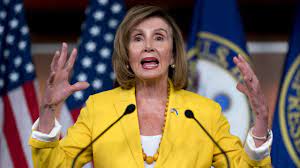Nancy Pelosi, the speaker of the US House of Representatives, left Malaysia on Tuesday and was scheduled to travel to Taiwan, raising tensions with Beijing, which regards the self-governing island as part of its territory.
The plane carrying Pelosi and her team flew from a Malaysian air force base after a brief stopover that included a lunch meeting with Prime Minister Ismail Sabri Yaakob, an official said on condition of anonymity because he wasn’t authorized to divulge details to the public.
This week, Pelosi is traveling to Asia, and observers are waiting to see if she would disregard China’s travel advisories to Taiwan.
Though her destination from Malaysia was unknown, local Taiwanese media stated that she would land on Tuesday night and make history by visiting as the highest-ranking elected U.S. official to be there in more than 25 years. She would spend the night in Taiwan, according to unnamed sources cited by The United Daily News, Liberty Times, and China Times—the three biggest national newspapers in Taiwan.
The foreign ministry of Taiwan declined to respond. Pelosi’s travel was not expressly confirmed by Premier Su Tseng-chang, but he did say on Tuesday that “any international guests and friendly politicians” are “very much welcome.”
China has previously threatened reprisal if Pelosi visits, stating that its military will “never sit quietly by.” China views Taiwan as a renegade territory that should be seized by force, if necessary.
“The U.S. and Taiwan have conspired to make provocations first, and China has only been driven to act out of self-defense,” Chinese Foreign Ministry spokesperson Hua Chunying told reporters Tuesday in Beijing.
Hua said China has been in close communication with the U.S. and made clear “how dangerous it would be if the visit actually happens.” In response to Washington’s “unscrupulous behavior,” any countermeasures China takes will be “legitimate and essential,” she said.
Fears of a fresh crisis in the Taiwan Strait, which separates the two sides, and might disrupt global markets and supply networks, have been stoked by China’s military threats.
The White House condemned Beijing’s rhetoric on Monday, asserting that the United States “will not take the bait or engage in saber-rattling” and that it has no interest in heightening tensions with China.
John Kirby, a spokesman for the White House National Security Council, emphasized that Pelosi would ultimately decide whether to travel to Taiwan. He mentioned that over the years, Congressmen have frequently traveled to the island.
According to Kirby, administration officials are worried that Beijing might use the visit as an excuse to engage in provocative retaliation, including military action like firing missiles into the Taiwan Strait or around Taiwan, conducting large-scale naval exercises in the strait, or flying sorties into the island’s airspace.
Simply put, Beijing has no motivation to create a crisis or exploit a hypothetical visit that is consistent with long-standing U.S. policy as an excuse to boost its aggressive military operations in or near the Taiwan Strait, Kirby said.
If Pelosi goes forward with the visit, U.S. Secretary of State Antony Blinken also asked China to “act responsibly.”
He told reporters at U.N. headquarters in New York, “If the speaker does decide to travel, and China attempts to create some sort of crisis or otherwise raise tensions that would be entirely on Beijing. In the event that she decides to visit, “We are looking for them to act appropriately and not engage in any more escalation,”
If Pelosi visits Taiwan, U.S. officials have stated that the military would transfer more personnel and equipment there. On Monday, the Philippine Sea was home to the USS Ronald Reagan aircraft carrier and its strike group, according to sources who talked on the record to discuss military operations.
Following a port visit in Singapore, the Reagan, the cruiser USS Antietam, and the destroyer USS Higgins headed north to their homeport in Japan. The aircraft carrier is equipped with a variety of aircraft, such as F/A-18 fighter jets and helicopters, as well as cutting-edge radar systems and other armaments.
After the Communists won a civil war on the mainland, Taiwan and China divided in 1949. Even though it recognizes Beijing as the government of China, the United States still has informal ties and military cooperation with Taiwan.
Beijing interprets official American contacts with Taiwan as an encouragement to formally recognize Taiwan’s long-standing de facto independence, a move that American authorities claim they oppose. Since former Speaker Newt Gingrich visited Taiwan in 1997, Pelosi, head of one of the three branches of the U.S. government, would be the highest-ranking elected American politician to do so.
Pelosi began her Asian journey on Monday in Singapore as fears about a potential visit to Taiwan spread around the continent.
During his discussions with Pelosi Singapore Prime Minister Lee Hsien Loong, he “highlighted the importance of stable U.S.-China relations for regional peace and security” according to the foreign ministry of the city-state.
Yoshimasa Hayashi, the foreign minister of Japan, reiterated this when he said in Tokyo that strong connections between the two hostile nations were “very vital for the international community as well.”
The Philippines urged China and the United States to operate in a responsible manner “in the area. “It is crucial that the United States and China maintain constant communication to prevent any errors and further escalation of tensions, “Teresita Daza, a spokesperson for Foreign Affairs, said.
Chinese pressure on Taiwan has been progressively increasing on the diplomatic and military fronts. As a result of President Tsai Ing-refusal wen’s to accept China’s assertion that the island and mainland collectively constitute a single Chinese nation, with the Communist dictatorship in Beijing serving as the only legal government, China severed all ties with Taiwan’s government in 2016.
According to Kim’s office, Pelosi will meet with South Korean National Assembly Speaker Kim Jin Pyo on Thursday in Seoul to discuss security in the Indo-Pacific area, economic collaboration, and the climate problem. Pelosi is also scheduled to travel to Japan, though it is unknown when.

















